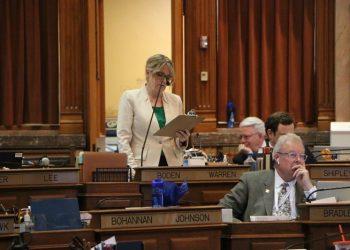(The Center Square) – Counties and cities would be unable to prevent landlords and lessors from rejecting applications to lease or renting out residences based on the prospective tenants’ use of federal housing choice vouchers if a bill is signed into law.
The House passed the bill, SF 252, on Monday in a 56-38 vote, predominantly among party lines. The passage followed two hours of debate and the proposal of several amendments with one amendment passing. The Iowa Senate passed the amended version on Wednesday in a 30 to 17 vote.
The bill now heads to Gov. Kim Reynolds’ desk.
Des Moines, Iowa City, and Marion have “source of income” ordinances that prohibit landlords from refusing to rent or lease based on applicants’ use of federal housing vouchers such as the Section 8 housing program, as KELO Newstalk 1320AM 107.9FM reported.
“[The federal section 8 housing program] is a voluntary program and we want to make sure that it remains voluntary for property owners and they can decide whether they want to participate or not,” the bill’s floor manager, State Rep. Dave Deyoe, R-Nevada, said on the floor of the House.
Deyoe introduced the single successful amendment: allowing city ordinances related to the bill that were in effect Jan. 1, 2021, to remain in effect until Jan. 1, 2023. Proposed amendments that failed included a call for the Iowa Finance Authority to investigate the need for low-income housing and whether housing vouchers have helped people find housing as well as exemptions for veterans affairs supportive housing vouchers, family unification program vouchers and a mainstream voucher for a non-elderly person with disabilities.
“I think we should trust our local governments to make these decisions,” State Rep. Eric Gjerde, D-Cedar Rapids, whose district includes portions of Marion. “It should be pointed out that these housing vouchers are not a free ride. Individuals much qualify for a voucher. Vouchers, both literally and figuratively, get someone’s foot in the door for a permanent housing solution.”
He called passing the bill “nothing but an overreach of state government.”
“It takes away the opportunity for local city officials who are elected exactly like we are to make decisions that are in the best interest of their constituents,” Gjerde said.
Iowa Apartment Association, Iowa Landlord Association, Eastlake Partnership, Landlords of Iowa and the Greater Iowa Apartment Association registered their support of the bill.
“The Greater Iowa Apartment Association supports SF 252, a bill to rein in the overreach of three specific Iowa cities that imposed additional federal requirements on rental housing providers who had opted out of the Section 8 program,” Greater Iowa Apartment Association’s Association Executive Christy Steva told The Center Square in an email.
“While many of our members are part of this and other rental assistance programs, we believe housing providers should have a choice as to how their small businesses are run and the option not to accept federal payments that would be accompanied by additional complex requirements. We support a landlord’s right to participate in this voluntary federal program, and not have de facto requirements forced upon them by city or county ordinance.”
Many nonprofits and associations have joined the Iowa-Nebraska Chapter of National Association for the Advancement of Colored People (NAACP), the Iowa Catholic Conference, the Iowa Conference of United Methodist Church, and the cities of Des Moines, Cedar Rapids, Iowa City, West Des Moines and Waukee in registering opposition to the bill.
“The Iowa Catholic Conference opposes the bill as it will not help solve the problem we already have in many areas of the state with affordable housing,” Iowa Catholic Conference Executive Director Tom Chapman told The Center Square in an emailed statement. “Landlords in these cities where the ordinances would be outlawed already have flexibility in accepting renters. You simply can’t exclude families only on the basis of the Section 8 voucher. … The bill does not allow cities to try and meet the housing needs of people the best they can. Over time, some tenants with unscrupulous landlords could lose their housing as a result of the bill.”
The Senate originally passed the bill in a 31-18 vote on February 17.
















